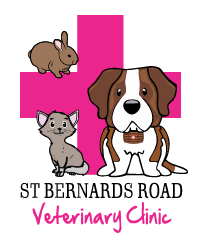Caring for your Pets
Dog Care Articles
Caring for your new Puppy
Your new puppy
Congratulations on the arrival of your new family member. The following information is provided to help you with all the necessary health care your new puppy will require, including worming, vaccination, heartworm prevention, flea control, nutrition, desexing and microchipping.
Puppy Pre-School
St Bernard’s Road Veterinary Clinic offers Puppy Pre-School classes for puppies between 8 and 14 weeks of age. These classes are a must for any pet owner wanting a well behaved, sociable dog. The classes place a strong emphasis on the importance of socialization and teaches basic training. Advice is available for any problems or questions you have regarding your puppy.
Wellness for Life
Dogs age around 7 times faster than people. Taking your dog to the vet once a year is like you having a check-up at the doctor or dentist every 7 years. That’s why we recommend puppies have early veterinary monitoring and then twice yearly wellness check-ups. Wellness check-ups allow us to detect, treat and help prevent health related problems early before they become painful and sometimes untreatable.
Vaccination
Regular vaccinations prevent serious and sometimes fatal diseases including Canine Distemper, Infectious Canine Hepatitis, Canine Parvovirus and the serious respiratory infection Canine Cough. Your veterinarian will also conduct wellness checks at the time of vaccination, and answer any health related questions that you have. Puppies need their first vaccination at 6-8 weeks of age, and then have another 2 vaccinations to fully protect them against these potentially fatal diseases.
One week after this full vaccination course, your puppy has optimal protection and can go outside and socialize with other dogs. Adult dogs require an annual vaccination booster every year. You will receive a reminder when your dogs’ yearly vaccination is due.
Heartworm Prevention
Heartworm disease can affect all dogs and is spread by mosquitoes. This disease can be very serious and if left untreated could result in the death of your dog.
Heartworm prevention should be commenced from 12 weeks of age. We recommend the Proheart SR12 heartworm injection as the most effective heartworm prevention for your dog. Puppies require 2 injections, but for adult dogs it becomes an annual injection. Heartworm prevention is needed for the life of your pet.
Worming
Worms including roundworms, hookworms, tapeworms and whipworms are a common cause of ill health in pets, causing loss of appetite, vomiting, diarrhoea and even death.
Puppies should be wormed from a very early age, not only for their health but for yours as well, as some worms can be transmitted to people. We recommend using Drontal Allwormer as the most effective way of protecting both your dog and your family against worms.
We recommend your puppy is wormed:
- Every 2 weeks until they reach 12 weeks of age
- Every month until they reach 6 months of age
- Every 3 months for life
Flea control
Fleas are unfortunately an ever-present nuisance to our pets – and our people. If fleas exist in the environment they will find a way to hook up with your dog, or with you. Fleas are not fussy about who they bnite, they are just looking for a blood meal. Don’t wait until you find fleas on your dog to do something about it, prevention is much better then cure when managing fleas.
We recommend giving your dog a Bravecto chew every 3 months for life to ensure you are not sharing your home with any fleas.
Desexing
In South Australia it is mandatory for all dogs born after 1 July 2018 to be desexed by 6 months of age. We consider the optimum age for desexing is 5 to 6 months old when the animal is approaching sexual maturity, but before female dogs come on heat for the first time.
We recommend that both dogs and cats be desexed at 4-5 months of age. It is ideal to desex female dogs and cats before they come into season for the first time.
For some large breed dogs there is the option to delay desexing until they are fully grown. We are happy to discuss the options with you and make the best decision for your puppy and your family.
As well as reducing the number of unwanted pregnancies, desexing can prevent pets from roaming, fighting or causing nuisance to neighbours. In females it significantly reduces the risk of uterine and mammary cancer and in males it reduces the risk of cancer of the prostate gland and testicles.
Dental Care
Providing your puppy with appropriate things to chew on will exercise the teeth and gums and prevent boredom. Add a dental diet and regular check-ups, and your pet will have the best chance of keeping healthy teeth for life.
Be careful when selecting toys, ensure puppies are not able to break pieces off and swallow them, having the potential to make them seriously ill. Greenies, Puppy Kongs and Rawhide chews are good for your puppies teeth and will provide hours of fun.
Nutrition—a healthy diet
Getting the correct nutrition as a puppy is very important. Therefore it is highly recommended to feed a high quality commercially available puppy or growth formula. We stock several varieties of premium quality dog foods at our veterinary clinic.
Puppies only have small stomachs and require small meals often. Three to four meals spread throughout the day is best. Milk is unnecessary and can cause diarrhoea in those that are lactose intolerant. Clean water must be available at all times.
Identification/Microchipping
In South Australia it is mandatory for all dogs to be microchipped by 12 weeks of age or at the point of sale.
Microchipping is a permanent form of identification in the form of a tiny chip, which is implanted under the skin. Registration details are kept with a national database and can be updated by the owner if there is any change in owner details. We use Biotherm microchips, which also allow us to check your dog’s body temperature simply by scanning the microchip. This is a much easier way of monitoring body temperature compared to using a thermometer. We recommend microchipping at the time of desexing as a tattoo is then placed in the right ear to identify your cat as being microchipped.
Bathing
Puppies generally do not require much bathing, however if this becomes necessary make sure you use a mild shampoo. Dogs’ skins are very different to ours. We recommend that your dog is bathed no more than once a week.
House Training
There are certain signs you should watch out for that will alert you that your puppy needs to go outside. These include walking in circles, sitting or whining at the door or sniffing on the ground. It is advisable to take your puppy outside first thing in the morning, after sleeping, after being left alone for a period of time, after eating and before they go to bed.
Accidents will happen! If you catch your puppy in the act you should immediately take them outside. NEVER spank your puppy, rub their nose in it or reprimand them after an accident. A puppy is too young to be able to connect this with what has been done wrong. Using praise is the best method of training. Puppies only want to please their owners. Give your puppy lots of praise when the right thing is done.
Pet Insurance
Pet Insurance is now available to cover your pet’s medical expenses including surgery, illness and accidents. The best time to take out an insurance policy is now - before your puppy develops any medical problems which will then be excluded from your cover.
See the article on "Pet Insurance" in the General Health Care section.


Home | Our Team | Caring for your Pets | Pet Products |
| FAQ | Our Patients | Latest News | Our Services
Site design | That's Graphic


